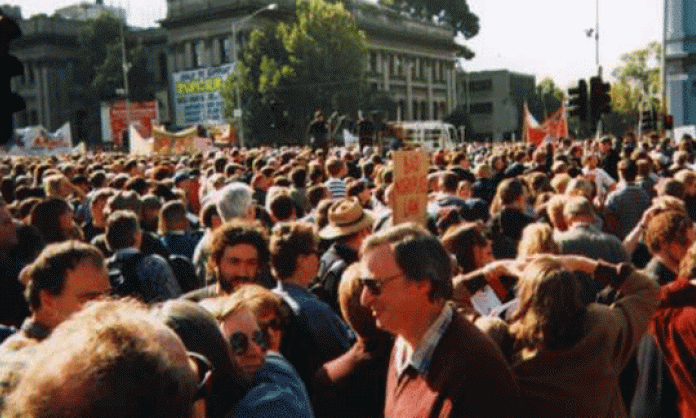Oscar Wilde’s famous assertion that the only thing worse than being talked about is not being talked about has, on occasion, led people astray.
But insofar as Wilde was pointing to the fact that lack of interest equals death, he had a point.
It is something that, two months after Joe Hockey brought down his budget horror show, the trade union movement and the left would do well to consider.
In the weeks before and after the budget, there was a protracted media storm over a bout of student activism, which started with the Q&A protest against Christopher Pyne and continued with a series of rowdy campus protests against visiting Liberal politicians.
The students were subject to a barrage of criticism in the media. Everyone from the usual suspects on the lunar right (yes, I’m talking about you, Andrew), to the hitherto fairly benign kitchen-show host Annabel Crabb, joined in.
The latter gave the students sage advice about how they needed to get with the twittersphere (because they would never have thought of that), the former demanded they be forced into national service or at least firmly spanked for their insolence.
Even on the left there were some worrywarts who expressed concern that the students were engaged in the dreaded practice of “harming their own cause”.
But in spite of the criticism, the student protests were astonishingly successful. They played a crucial role in injecting a spirit of resistance into the widespread hostility to the budget. While almost every section of society was resentful of Hockey’s savage austerity measures, the students were the one group who seemed determined to fight.
Which brings me to the union campaign. In the last month, there have been two sizeable union-organised rallies against the budget, the first on 12 June and the most recent on 6 July.
Both brought tens of thousands of people onto the streets, many more than the (still impressive) number the students managed at their national protest on 21 May.
And yet these union protests have had little impact on the national political debate. They were reported, sure (more than the March in March rallies, which were essentially censored), but in the kind of perfunctory way that a local paper might report on the regional fair.
It is, in a way, a bizarre situation. The unions, unlike the mostly socialist-led student movement, actually have the power to crush this government. With almost 2 million members, and the industrial power to grind the country to a halt, the unions are a formidable social force. And yet their anti-budget protests have caused far less angst for Andrew Bolt and his band of right wing loons than a few students saying their bit to Liberal politicians.
The problem is that the union movement, while it has been willing to stage a few token protests, has given no indication that it actually wants to lead resistance to the government. It will pull people out for the occasional protest, but these are conceived as displays of public opinion, not a threat to disrupt the orderly management of government business. It’s street protest as a form of opinion polling.
The real point of protest, though, is not to register opinion. Online petitions, opinion polls, letters to the editor and talkback radio are all perfectly adequate for that.
Protests are about sending a message that the powers that be can rule only with the consent of the governed. Protests are a threat to withdraw that consent, and a practical demonstration of the forces that could challenge the status quo.
That’s why, when union protests imply the threat of serious industrial action, they strike fear in the heart of the ruling class. When 80,000 marched through Melbourne in defence of the Maritime Union in Melbourne in 1998, the establishment were in meltdown because they feared the force they saw on the streets might shut down every major industry in the state.
But when unions themselves act as though protest marches are not demonstrations of industrial muscle but extensions of a change.org petition, it is easy to understand why the government and the press ignore them.
A few students seem much more menacing.





